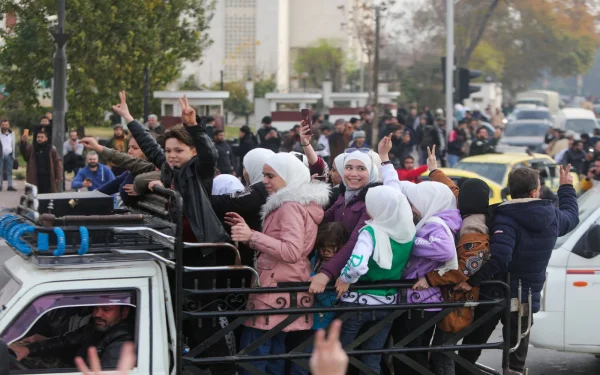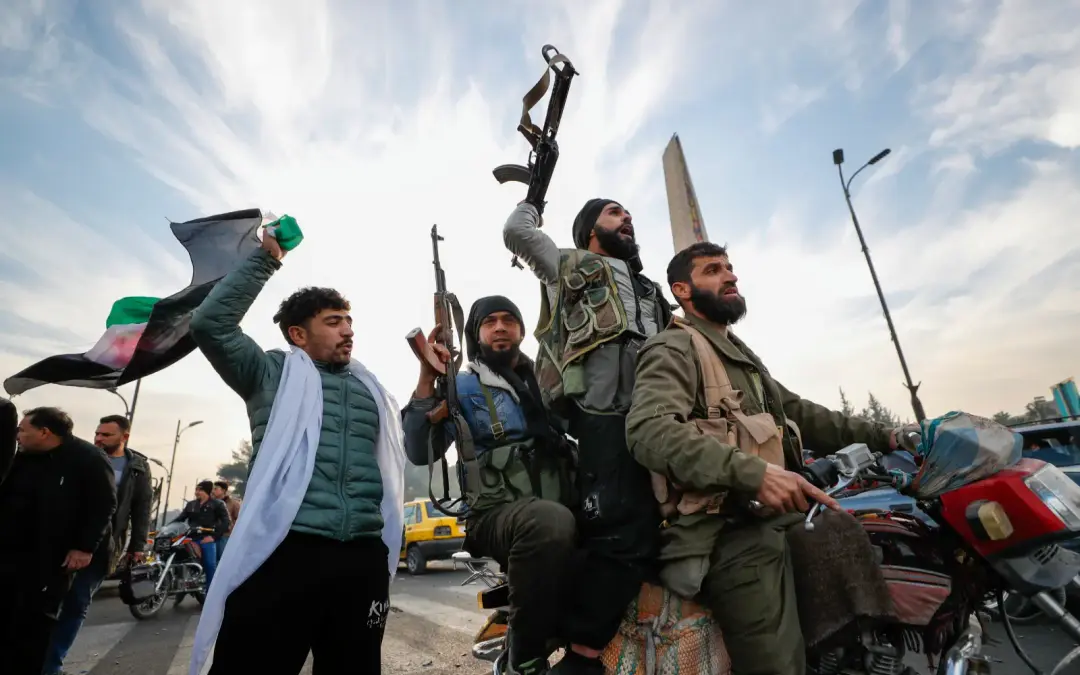On Sunday, December 8, the Syrian National Army and HTS officially captured Damascus, the capital of Syria, leading the Syrian president Bashar al-Assad to seek asylum in Moscow. Mohammad Ghazi al-Jalali, the prime minister who had not fled, expressed his desire for a peaceful transfer. “[Jalali] said in a statement from his home in Damascus that he was not leaving Syria and was willing to conduct a peaceful transition of power [and] called for all Syrians, including the opposition, not to damage state institutions or harm anyone,” Barak Ravid of Axios reported.
The rebel groups seemingly have taken well to this suggestion, with its leaders instructing their followers to leave government sites alone and to al-Jalali for the time being. This overthrow led to the start of a new era in which the Assad regime was no longer in control of Syria.
“One Syrian opposition leader [said] that their goal is not revenge, but restoring security and stability to the country,” Ravid said.

That day, the Syrians celebrated the entry of whom they consider their liberators with public gatherings denouncing Assad, vandalisms of his images, and the desecration of his father’s tomb. Assad had been a doctor-turned-dictator, who was notorious for using chemical gas on his own people, leading to world leaders denouncing his actions.
“Many [are] dead, including women and children, in mindless CHEMICAL attack in Syria,” United States President Donald Trump said on X, formerly known as Twitter, in 2018. “President Putin, Russia and Iran are responsible for backing Animal Assad. [There is a] big price… [to pay.]”
Furthermore, Assad had contributed to one of the biggest humanitarian crises in addition to his crimes against humanity.
“During the civil war, which erupted in 2011 as an uprising against Assad, his forces and their Russian allies bombed cities to rubble,” Reuters stated. “The refugee crisis across the Middle East was one of the biggest of modern times and caused a political reckoning in Europe when a million people arrived in 2015.” As a result, it was unsurprising that most of the global population from world leaders to citizens supported the overthrow with gladness.
Because HTS itself is internationally regarded as a terrorist organization due to its own reported crimes against humanity, the question regarding the future of Syria amidst this power vacuum is raised. It appears that there is already a plan in place for the transition by the rebels.
“The rebels said they were forming a transitional government, and called on public sector employees to return to work,” The New York Times reported. “The statement did not name the leader of the transitional government, but local news reports said it would be Mohammed al-Bashir, who was previously the head of a rebel-run administration in northwestern Syria.”
Furthermore, the rebels implied that they would retain most or some of the former government’s staff. This provides some reassurance about the stability of Syria’s new state.
Another factor that may be increasingly reassuring is the fact that HTS is becoming decreasingly jihadist.
“HTS’s current political-religious ideology frames the group as strictly Syria-focused and religiously moderate,” Mackenzie Holtz of the Center for Strategic and International Study noted. “Since 2017, HTS has incorporated various independent religious and political leaders into its internal institutions to appease factions and build a religious bureaucracy, a process that has helped moderate the group […] Today, HTS is more recognizable as an authoritarian statelet than the transnational Islamist militia it once was.” It appears that HTS’s goal has slightly changed from focusing on Islam but recentering on Syrian patriotism and/or nationalism.
The Biden administration stated that they would support the new Syrian government and would not interfere.
“The U.S. government would ‘recognize and fully support’ a future Syrian government that results from an inclusive and transparent transition process, Secretary of State Antony Blinken said Tuesday… [calling] for a ‘Syrian-led and Syrian-owned political transition,’” a Washington Post live briefing stated. They further added that the United States does have some political leverage in their hands, as American sanctions “have long crimped the [former regime’s Syrian] economy.” World leaders can only wait and hope for the development of a more ethical and cooperative Syrian government.
Civilian recovery efforts already started in Damascus, as citizens immediately flooded Syria’s Sedayna prison. It was known to have been used hold political prisoners in torturous conditions in which many died due to intentional abuse such as rape. In addition to the violence used by guards, the prison’s windowless underground layout itself was torture.
“The narrow cells, no more than a few meters across, had been stuffed with more than a dozen people at a time, leaving no space to lie down, according to rights groups,” The Guardian reported.
Furthermore, the style that the prison was built perpetuated a sense of sameness, leading to even the citizens to be continually lost as they explored the maze-like complex. Meanwhile, messages begging for death on the interior walls of the prison have been discovered, showing the desperation of the prisoners. Much to the disapproval of some HTS members, the people have attempted to find their imprisoned family members among the survivors themselves ever since Sunday.
These labyrinth-like structures have led desperate family members to believe that other prisons exist.
“[Syrian] rescuers on Tuesday called on Russia to pressure former president Bashar al-Assad into providing maps of secret jails and lists of detainees as they race against time to release prisoners,” the organization Agence France Presse wrote in an article distributed by Barron’s, The Straits Times, and Free Malaysia Today. Because the Sedayna prison was underground, many people had been concerned about the oxygen flow those prisoners had received. As a result, they believe that if they do not act fast enough to break the other prisoners out, those prisoners may die from asphyxiation even though they were already unknowingly “free” from the regime.
Despite the positive change for many Syrians, this success also became a weakness. Israel has successfully used this opportunity to invade the now undefended and Hezbollah-absent Syria themselves, which they had not done for 50 years.
“They have since taken control of a 155-square-mile demilitarized buffer zone in the Golan Heights that has been patrolled by U.N. troops since the 1973 Middle East war,” The New York Times stated.
This offensive consists of ground invasions and airstrikes on military targets, the latter already occurring before the rapid takeover by HTS. Notable targets of the airstrikes were the chemical weapon factories. Israel’s Prime Minister Benjamin Netanyahu defended the action, citing that it is to preserve Israel’s security.
“The assault delivered a blow to the infrastructure in Syria that Iran used to transport weapons to Hezbollah in Lebanon,” The New York Times additionally stated. “The Israeli defense minister, Israel Katz, congratulated the country’s missile ships on Tuesday for completing ‘the destruction of the Syrian Navy’ the night before.”
Critics of Israel’s actions, such as the United Nations as well as Egypt, believe that this move was unfair, as it breaches a treaty and will destroy the chance of Syria becoming a cooperative and functioning country.
Syria’s change in leadership led some Syrians to leave the country in fear of their safety and the stability of their country.
“The UK government [and the Greek government] announced that it would pause decisions on asylum claims from Syrians,” BBC stated. On the other hand, some Syrians who had fled in the past chose instead to return to their homeland with a hope for a better future.
As days continue to pass and developments are continually made, one may only hope with them that Syria will emerge with a more ethical and stronger country than ever before.








